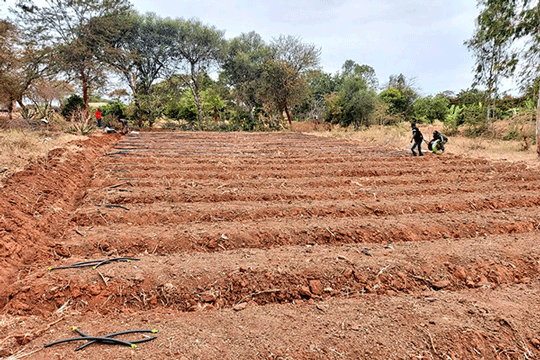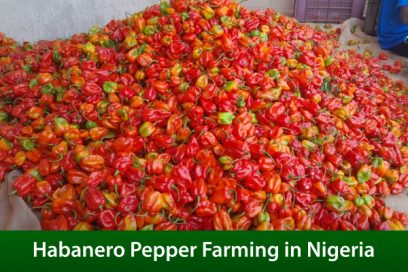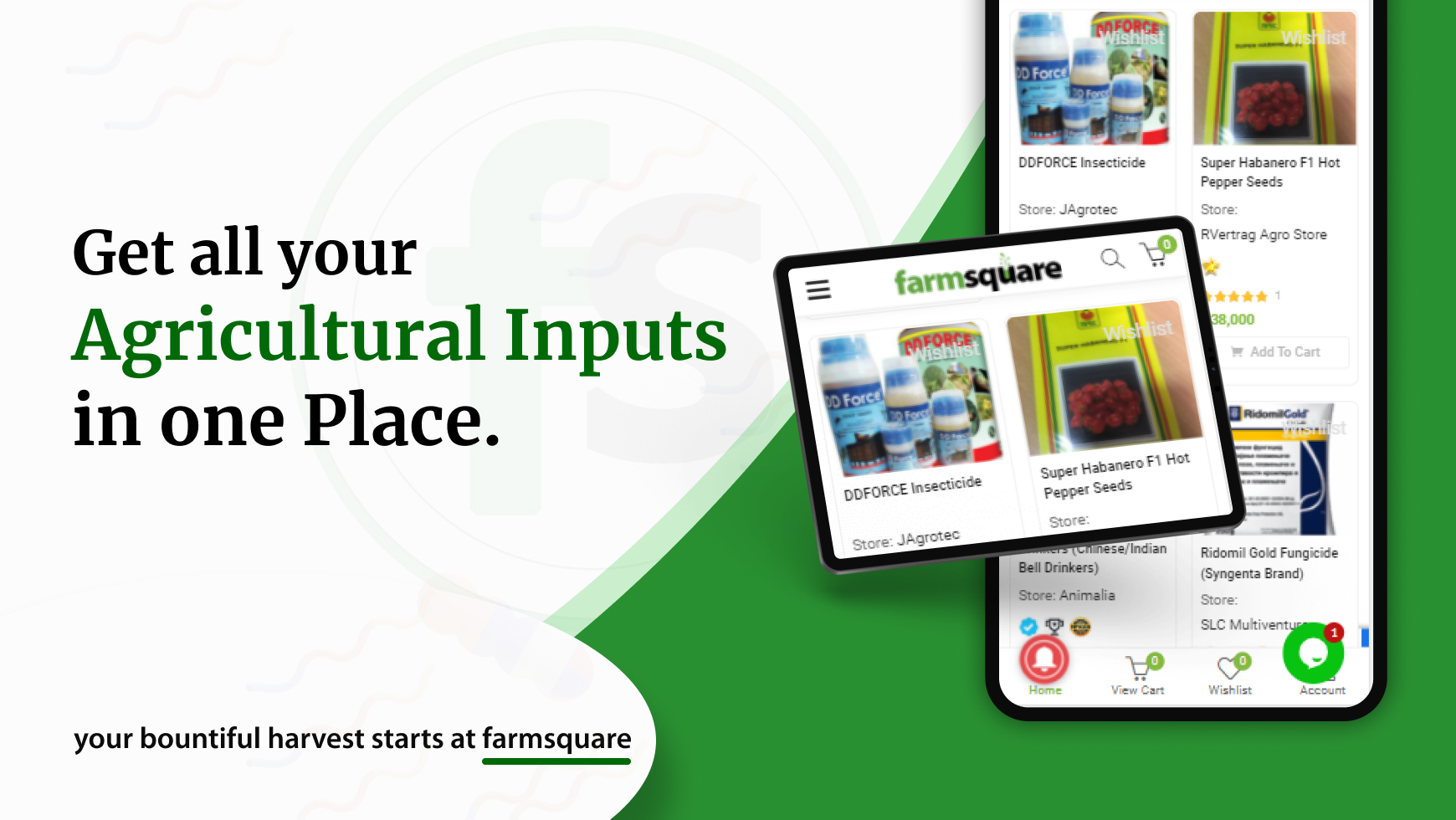- You have no items in your shopping cart
- Subtotal: ₦0
Dry Season Farming…
Majority of smallholder farmers in Nigeria depend on rain-fed agriculture and cannot obtain sufficient water resources to participate in large-scale production in the dry season, this can lead to shortages of important local crops, high market prices and lack of technology to grow them when the conditions are not favourable.
Rainfed agriculture provides a rich production platform for all farmers. This allows agricultural products to be delivered almost simultaneously, causing an oversupply above average demand and therefore causing prices to fall. But dry-season agriculture attracts true agricultural entrepreneurs who understand the important role of seasons in determining commodity prices and therefore offer better opportunities for high profits during the dry season.
What Is Dry Season Farming
Nigeria’s dry season agriculture starts in late October and runs until late March. Dry periods are worst from early December to late February. Nigeria’s patterns and unpredictable rainfall mean that farmers have to participate in dry season agriculture to increase their income.
Advantages of Dry Season Agriculture
What you can plant in dry season are cotton, rice, tomatoes, onions, watermelon, cucumber, carrots, peppers, sweet potatoes, okra, spinach, eggplant, garden egg, melon, Ugu and maize. In general, dry season farming increases food supply and ensures the best prices throughout the year. Recently, the government has significantly increased its participation in such agricultural practices, increasing investment in dry seasonal agriculture.
The prices of fresh agricultural products from the dry season farming are higher. This is the case in a free economy, where supply and demand forces play an important role in determining product prices.
Dry season farming helps to improve the quality of the land used. This process helps to regulate soil temperature. Furthermore, having irrigation system on the farm helps to improve the moisture status of the soil. It also helps dissolve soil nutrients and make them available to plants. Dry season cultivation can also increase the water content of plant fibers and plant size.
Selected Posts:
Rainy Season Farming In Nigeria.
Irrigation Systems: Types And Their Benefits.
Constraints Facing Dry Season Farming
The four most critical challenges for agribusiness in this season are inadequate inputs, lack of access to irrigated land (water), high cost of equipment and insufficient financing. It is noteworthy that these four challenges identified as the most important, account for more than half the problem of farmers.
Others challenges are;
- Pest and disease problem
- High cost of hired labour
- Polluted water
- Pilfering
- Transportation
- Marketing problem
How To Prepare For Dry Season Farming
Prepare Your Land
In the dry season, the first step is preparing your land for agriculture. The method of preparation differs slightly from that of the rainy season. Prepare the soil by cleaning and leveling the soil. After the land is ploughed, fertilizer can be supplied through irrigation system.
Greenhouse Set-up
Small scale greenhouse could covers an area of 8 m x 24 m. You can grow a variety of vegetables, but it’s best to use vegetables that aren’t planted during the rainy season. For example, if everyone grows tomatoes, greenhouse farmers can grow peppers because not many farmers grow peppers in dry season.
Green peppers, melons, cucumbers, watermelons and many other vegetables are grown in greenhouses. It is used with drip irrigation facilities, where cultivated vegetables need minimal pesticides because greenhouse nets can prevent pests. Drip irrigation can also be used on open farmland.
Irrigation System
In dry season agriculture, strong irrigation methods are factors that ensure the success of the agricultural system. Due to irrigation technology, agriculture could be capital intensive in the dry season. Therefore, it is necessary to carry out a feasibility study establishing the expected return on your investment. The most important aspect of the research is the crops that are planted. Research should be able to show that the crops that are planted will make a reasonable profit for you.
To accelerate food production, self-sufficiency and above-average GDP growth rate (50%), the potential of small-scale irrigation must be explored. This will ensure wet season and dry season agricultural production, and can promote social and economic transformation of the rural population and poverty alleviation.
Improvements in current irrigation infrastructure, such as supplying pumps, acquiring groundwater through wells and boreholes, protecting surface runoff during rains, improving the efficiency of water transport and distribution, improving the efficiency of systems irrigation and drainage; Disposal of waste near the river bank is recommended to maintain agricultural production through irrigation and the environment.
Irrigation facilities are usually built in the form of canals, dams or water reservoirs. So water can flow through the ridges. Water supply can also be carried out in rows of plantations or trees. In general, correct irrigation plans and techniques are essential to achieve optimal crop growth. It is very important to use the correct irrigation plan for the type of crop you are growing. Irrigation practices in dry season farming affect soil microbial processes. It can also affect the nitrogen content of the soil through the nitrification process. Ideally, proper irrigation practices should increase crop growth and yield.
HandPicked Posts:
Soil-less Crop Farming.
Climate Smart Agriculture (CSA).
Here are 3 main types of Irrigation, which will certainly increase your production and profits in dry season;
1. Irrigation Tube
This irrigation system is a flat, flexible hoses, perforated at equal points to make holes for water to pass through. Water moves with pressure through the holes. It has a spray length and an average coverage area of 4m (2m left and 2m right). This means that a 1000m nozzle is enough to irrigate an acre. Your water source could be from a 5m high top tank, pump water directly from wells, wells, or bodies of water.
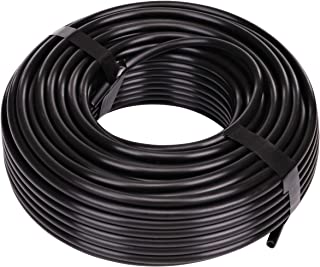
You can use Irrigation tube for all leafy vegetables, cucumber, lettuce, bitter-leaf, water-leaf, watermelon, ugu, ewedu, plantain, rubber, etc.
2. Rain Gun Sprinkler
They are shaped like a gun and have a long range (the speed they cover). A rain gun can cover 1 hectare of land and can rotate 360 degrees.
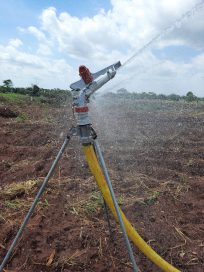
What are the benefits of Rain Gun Sprinkler?
a. Many farmers use rain-guns-irrigation system to eliminate pests and diseases when irrigating.
b. Nitrogen is one important nutrients that plants need for proper growth and development. Since the rain gun looks like rain, the water dissolves nitrogen from the air and transfers it to the soil, which adds nutritional value to the soil.
You can use rain-gun sprinkler for lettuce, water-leaf, ugu, rubber, plantain/banana, oil palm, pineapple, green leafy vegetable generally.
3. The drip irrigation system
This is highly preferred by most farmers we’ve worked with because of the efficiency and effectiveness. Water aids the presence of diseases on crops like tomatoes, some exotic vegetable, certain varieties of cucumbers, etc. This is why drip irrigation will supply water to the root zone of plants and not leaves. Many smallholder farmers don’t use this irrigation system because it’s expensive to set up.
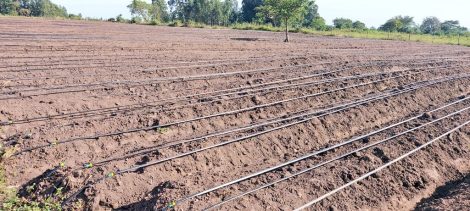
- Drip Irrigation Kit For 1 Acre;
1. 4 rolls of 0.4mm drip tape.
2. 100 pieces of offtake connectors(with valve).
3. 100 pieces end caps.
4. 300 pieces of hold down support.
5. 1 roll of lay flat 100m.
6. 100 pieces of joiners.
7. Venturi and filter.
A complete kit could cost more than N300,000. You can cultivate crops like cucumber, maize, bitter-leaf, cassava, melon, lettuce, banana, water-leaf, ugu, pineapple, oil palm, ewedu, shoko, rubber, etc under drip irrigation system.
Selected Post For You: 19 Dry Season Farming Crops To Plant.
Conclusion
Farmers need to take proactive steps to protect themselves from missing out of the benefits of dry season farming. They should work closely with extension agent and farmsquare.ng. Don’t leave your plants to risks from lack of water. Apply modern strategies to harvest water during rainy season. NOTE: You can purchase all these irrigation kits from farmsquare.ng at affordable prices and get it shipped to you within Nigeria.

